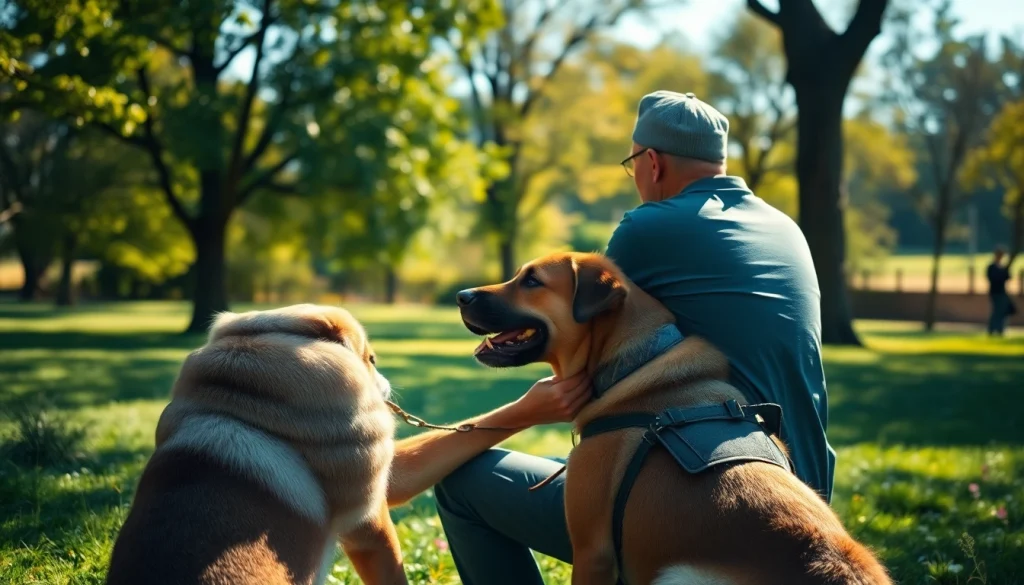Healing Through Companionship: The Role of PTSD Service Dogs

Understanding PTSD Service Dogs
What Are PTSD Service Dogs?
PTSD service dogs are specially trained canines that assist individuals suffering from Post-Traumatic Stress Disorder (PTSD). Their primary purpose is to help mitigate the psychological symptoms associated with this condition, which often includes anxiety, flashbacks, and feelings of isolation. These dogs are not just companions but are skilled in performing specific tasks tailored to their owner’s needs, making them invaluable partners in daily life. As the understanding of mental health evolves, the significant role of PTSD service dogs in treatment plans has garnered increasing recognition and support, particularly among military veterans and first responders who frequently experience trauma-related conditions.
How PTSD Service Dogs Assist Individuals
PTSD service dogs assist individuals in various ways, all aimed at improving their quality of life. Some services provided by these dogs include:
- Anxiety Reduction: Service dogs can help reduce anxiety during public outings or stressful situations by providing a calming presence.
- Interrupting Flashbacks: When a dog senses that their handler is becoming overwhelmed, they may interrupt the cycle of a flashback by nudging or laying on the person, grounding them back in the present.
- Search and Rescue: In the event of heightened anxiety or panic, a service dog trained in search techniques can help find secure locations or assist in navigating unfamiliar environments.
- Alerting to Panic Attacks: Certain dogs are trained to recognize signs of impending panic attacks and can signal to their handlers to engage in grounding techniques.
- Medication Reminders: Many service dogs are trained to remind their handlers to take medications at prescribed times, ensuring they adhere to their treatment plans.
Legal Protections for PTSD Service Dogs
PTSD service dogs have various legal protections under federal and state laws, primarily designed to ensure their access to public spaces. The Americans with Disabilities Act (ADA) recognizes service dogs as essential for individuals with disabilities, allowing them to accompany their handlers in places such as restaurants, stores, and public transportation. However, certain regulations apply; for example, business owners can only inquire whether a dog is a service animal and what tasks it has been trained to perform. This protection highlights the integrity of the bond between service dogs and their owners and emphasizes the need for comprehensive training these dogs undergo to assist effectively.
Benefits of Adopting a PTSD Service Dog
Emotional Support and Stability
The emotional support provided by PTSD service dogs can be life-changing for individuals grappling with the effects of trauma. The presence of a dog can alleviate feelings of loneliness and isolation, as these animals forge deep emotional bonds with their handlers. Many individuals report a significant decrease in symptoms of depression and anxiety owing to the unconditional love and companionship provided by their service dogs. Furthermore, the act of caring for a dog can foster routine and purpose, contributing to overall emotional stability.
Practical Tasks Performed by PTSD Service Dogs
Beyond providing companionship, the practical skills of PTSD service dogs can substantially enhance a handler’s daily functioning. The following are some of the essential tasks these dogs are trained to perform:
- Deep Pressure Therapy: Dogs may be trained to apply pressure by laying on their owner during panic attacks or anxiety episodes, which can help calm the individual.
- Creating Personal Space: A service dog can be trained to create physical space in crowded areas, helping their handler feel more secure.
- Guidance and Mobility Assistance: For those who struggle with balance or mobility due to PTSD-related conditions, service dogs can provide guiding support to help navigate spaces effectively.
Long-Term Health Benefits
The long-term health benefits of incorporating a PTSD service dog into one’s life include a decrease in the severity of PTSD symptoms, improved social interactions, and better management of day-to-day activities. Research indicates that the presence of a trained service dog can foster an environment conducive to healing, helping handlers reintegrate into society and rebuild relationships strained by their trauma. Additionally, increased physical activity through daily dog care and exercise contributes positively to mental health, promoting a healthier lifestyle.
Finding the Right PTSD Service Dog
Assessment of Needs for PTSD Support
Before acquiring a PTSD service dog, it is crucial to thoroughly assess personal needs. Individuals should consider their specific PTSD symptoms, lifestyle, and daily routines. A thorough assessment can help in determining what tasks the dog needs to perform and what qualities are essential in a service dog. This process may involve consultations with mental health professionals, trainers, and service dog organizations to ensure the best match between the dog’s skills and the handler’s needs.
Training and Certification Processes
PTSD service dogs must undergo extensive training to be effective at performing their designated tasks. This training typically includes basic obedience commands, advanced task-specific training, and socialization in various environments. Although service dog training can vary in duration, it’s essential that the animal is certified through recognized programs to ensure compliance with legal standards. Certification can provide peace of mind to handlers, affirming that their service dog is well-trained and capable of performing the necessary responsibilities associated with mitigating PTSD symptoms.
Where to Locate PTSD Service Dogs
Finding a reputable source for acquiring a PTSD service dog is vital. Many organizations specialize in training service dogs for those with PTSD, often matching individuals with dogs based on their specific needs. Researching local and national service dog organizations can facilitate this process. Prospective handlers can also connect with community resources or local shelters that may offer programs to train rescue dogs for PTSD support. Ultimately, working with a trusted organization can ensure appropriate placement and ongoing support following the adoption process.
Challenges in Integrating PTSD Service Dogs
Common Misconceptions About Service Dogs
Despite the increasing awareness of PTSD service dogs, several misconceptions remain. A prevalent myth is that all dogs can serve as service dogs, which is inaccurate; specific training is necessary for service dogs to perform their tasks effectively. Another common misconception is that service dogs are designed solely for physical disabilities, while in reality, many are trained to support mental health conditions, highlighting the importance of proper education about the capabilities and rights of these animals.
Overcoming Social Stigmas
Social stigmas surrounding mental health and the use of service dogs can create additional challenges for owners. People may not always understand or be accepting of individuals with PTSD and their service dogs. Education and advocacy play pivotal roles in dispelling these myths. By sharing personal stories and experiences regarding the benefits of service dogs, handlers can foster understanding in their communities. Additionally, educating the public about the legal rights of service dogs may help mitigate negative interactions.
Adjusting to Life with a PTSD Service Dog
Transitioning to life with a PTSD service dog can be a significant adjustment. Handlers may face challenges in adapting to their new responsibilities, including managing their dog’s training and care. Gradually integrating the dog into everyday routines can lead to positive outcomes. Establishing consistent schedules for feeding, training, and bonding activities will strengthen the partnership and maximize the effectiveness of the service dog’s supportive role. Seeking guidance from trainers and ongoing support from therapeutic resources can also facilitate a smoother integration process.
Success Stories of PTSD Service Dogs
Heartwarming Testimonials
Numerous heartwarming testimonials exist from individuals who have benefited from the companionship and support of PTSD service dogs. Many describe profound changes in their emotional well-being, citing a renewed sense of purpose and improved coping strategies following their dog’s arrival. These narratives often highlight the deep bond formed between the handler and their service dog, showcasing the life-changing effects of this connect.
Case Studies of Transformation
Case studies further illustrate the transformative impact that PTSD service dogs can have on individuals. For instance, several veterans have reported significant improvements in their ability to manage daily life activities and social interactions after having a service dog by their side. These documented experiences frequently encompass reduced instances of panic attacks, better sleep quality, and a more positive outlook on life, all resulting from the emotional support and specific interventions provided by their trained canine companions.
Community Impact and Awareness
The integration of PTSD service dogs into communities has not only helped individual handlers but also raised awareness around mental health issues associated with trauma. As more people understand the importance of service dogs in managing PTSD, communities become more supportive of mental health resources and initiatives. Educational campaigns and outreach efforts can illuminate the critical role that PTSD service dogs play in recovery, promoting a broader societal commitment to understanding, supporting, and advocating for mental health and service dog assistance.







